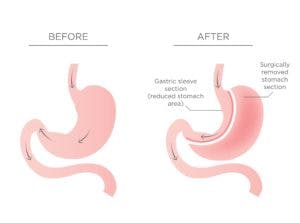 Side effects of gastric sleeve surgery
Side effects of gastric sleeve surgery
Let's take a moment to look at some of the surgery side effects and what patients may be able to do to alleviate these issues.
What Happens During Gastric Sleeve Surgery
Gastric sleeve surgery, also called a sleeve gastrectomy, is a popular option for surgical weight loss. During the procedure, the size of a patient’s stomach is permanently altered by stapling it vertically, removing the larger curved portion and closing the area with sutures. Thanks to the reduction in stomach size, patients consume fewer calories and lose weight rapidly and safely as a result.
Even though the gastric sleeve procedure is much less invasive than a gastric bypass and other kinds of weight loss surgeries, you need to consider the side effects.
Soreness and Discomfort
Soreness and discomfort is one of the most common side effects of any surgery. Even though the procedure is performed laproscopically, you will notice some discomfort around the abdominal region. Manage your pain by getting proper rest, especially in the days immediately following surgery and by taking any prescribed pain relievers as recommended.
 Bruising and Swelling
Bruising and Swelling
Bruising and swelling are also common side effects that patients can experience after any surgical procedure. Thankfully these are only temporary side effects that will fade on their own with time.
Major bruising typically fades by the end of two weeks, while minor bruising may persist for a month. Swelling is also common for about a month, although you may experience some minor swelling for a few months.
For both bruising and swelling, patients should consider light walking during recovery as this activity helps promote blood circulation and improves healing.
Hiccups
Hiccups remain a bit of a mystery with regard to bariatric surgery procedures and their side effects. They can occur frequently, with no rhyme or reason. Many patients notice that eating or drinking too fast can trigger hiccups, which is why it's important to savor your food and drink water slowly in-between meals.
Nausea
Nausea is one of the more side effects. Changes in your diet, your digestive tract, and your eating habits after surgery all contribute to occasional feelings of nausea after the procedure. While it’s not clear what causes nausea, it’s normal and may be partly due to food staying in your stomach for longer periods. Your body is becoming attuned to its needs and this slight discomfort may end up becoming useful to your health in the long run.
Diarrhea
Diarrhea can be a serious problem for some patients that persists long after surgery. This problem can occur for several reasons, including alterations in gut microbiota and rapid exposure of the small intestine to undigested nutrients. Cases that last for a long time can lead to dehydration and malnutrition.
Hair Loss
The major changes to your diet and digestive tracts may also cause your body to experience stress, which can lead to hair thinning as your follicles switch to a temporary resting phase. Your hair loss will stop and reverse itself in the months ahead as you recover from surgery side effects and your body gets used to your new diet and you become healthy again.
Long-Term Problems
Sometimes patients experience long-term problems as a result of gastric-sleeve surgery side effects. Some issues can be managed by medications, while others may require a revision procedure. The most common problems are:
- Gastroesophageal Reflux Disease (GERD)—Heartburn and other GERD symptoms, such as bloating, feelings of fullness and upset stomach are common after surgery and require medication.
- Stomach Ulcers—Also known as peptic ulcers, these are more common after gastric sleeve surgery and are typically diagnosed during an upper endoscopy when a patient experiences bleeding or pain in the stomach area.
- Gallstones—Are more common after all types of bariatric surgery making a cholecystectomy to remove the gallbladder more common for bariatric patients.
- Stomach Obstruction—Scarring and narrowing of the outlet of the stomach can make it difficult or even impossible to digest food. Surgeons typically fix this complication by stretching or surgically fixing the area that has narrowed.
Follow Pre-op and Post-op Instructions to the Letter
The best way to deal with any side effects after gastric sleeve surgery is to prepare properly for the healing process. Follow all pre-op instructions to the letter as well as your post-op instructions very carefully. Pre-op instructions get your body ready for the healing process, ensuring the best health possible going into surgery. Post-op instructions will give you the info you need to heal properly and quickly.
We can discuss all aspects of surgery in greater detail during a virtual consultation with one of our coordinators.
Contact Tijuana Bariatric Center
For more information about gastric sleeve surgery (and side effects), how it can help you lose weight and improve your overall health and wellness, contact our team of bariatric surgery specialists today by calling 800-970-0577. The entire team here at Tijuana Bariatric Center look forward to your visit and helping you achieve total wellness.

